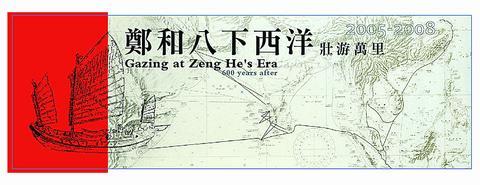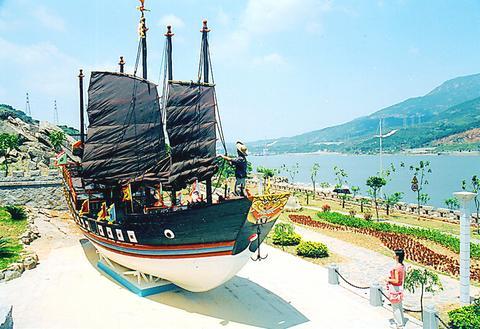In July 1405, Admiral Zheng He (
Six hundred years later, in July next year, Zheng's voyage will be recreated, with volunteers from Chinese societies. The expedition team is called "Gazing at Zheng He's Era, 600 years After, 2005 to 2008 (鄭和八下西洋探險隊, 2005 -- 2008).
"We want to commemorate Zheng as the first hero in the history of Chinese sea exploration. And we want to look for the kind of adventurous spirit and the peace-loving mind and generosity which was demonstrated in Zheng's journeys," said Alan Hsu (

After the Taipei press conference on Dec. 19, the society held another press conference in Beijing, announcing its recruiting project. "We want people from the four regions of Chinese society to come join us," Hsu said.
At the preliminary stage, the society will choose 30 members and 10 substitute members. After a few months of training, the team will be wittled down to 10 people, as the final number of team members.
"Ideally, we hope to have four from Taiwan, four from China, one from Hong Kong and one from Macao," Hsu said.

If all goes well, "Gazing at Zheng He's Era" will be a rare sea adventure in the Chinese-speaking world. In previous years, in Taiwan and China, there have been various events sponsored by the public and private sectors to commemorate Zheng's historical achievement.
July 11 has been set by the Taiwan government as "Sailing Day" (
In China, museums, monuments and academic research institutes that celebrate Zheng's achievements have been launched.
Last May, Taitsang City -- the original port of departure for his journeys -- held the first Zheng He Sailing Festival.
But the first adventure event celebrating the 600th anniversary of Zheng's voyage was started by a Taiwanese non-profit organization.
"Anyone over 20 years old, from any of the four regions, are eligible to apply. This will be an unforgettable experience and achievement for anyone involved in the project," Hsu said.
One particular attraction of the trip is that it will painstakingly recreate the conditions and tools of the time. After two years of research, SEE Taiwan has found junk-building masters from Fujian, Zhejiang and Jiansu provinces.
The society is still looking for a suitable shipbuilding plant and it is estimated that it will take about 10 months to a year to finish building. The cost, according to Hsu, willl be around NT$90 million. The boat will be 25m long, 5.5m wide and about 60 tonnes to 70 tonnes, Hsu said -- several times smaller than the size of the giant junks used in the Ming dynasty.
The replica junk will be installed with an engine and modern navigation technologies such as a GPRS navigation system, weather maps and a computer system. It is, according to Hsu, a motorized junk.
In Zheng's time, of course, the fleet was entirely dependent on wind. The fleet set off from Taitsang and stopped at the ports of Changle City (
For the journey next year wind power will be harnessed. "We will use the engine only when necessary, for example, to avoid boats when entering a port, or when confronting bad weathers or waves," Hsu said.
According to SEE Taiwan's plan, after about 33 months of voyaging, the team will stop at Taiwan's Kaohsiung and Keelung ports for a few days, and then return to Taitsang City in June, for a closing press conference in Beijing in July. The date will coincide with the opening of the 2008 Olympics Games in Beijing.
But, during the three years of the voyage, what will team members be doing? Zheng He exacted tributes from China's neighbors, participated in religious ceremonies (Zheng was a Muslim) and helped open up trade routes to the Middle East.
This time round, the team members will revisit the relics and monuments Zheng left in countries such as Malaysia, Indonesia, Sri Lanka, India, Yemen and Saudi Arabia. Also, history researchers from the Chinese Social Science Academy will do field research during the journey. One of the team members will be responsible for making a documentary film about the three-year voyage.
"And don't forget, we have to be careful about the pirates on the sea," said Peter Yu (
Established in 1999, SEE Taiwan's first exploration activity was "Trekking Without Genghis Khan, 800 Years Later" (
Alan Hsu, the initiator and organizer of SEE Taiwan, is himself a fanatic for adventure. From 1985 to 1987, Hsu and three companions went on a trek of 15,000km around the globe, becoming the first four Taiwanese to walk around the world.
After being a journalist concentrating on outdoor and exploration activities for 10 years, Hsu decided to quit the job and started his Society of Extreme Exploration.
"It's not only just my personal interest. I think in each country or culture, there is a need for the spirit of exploration and adventure. This is particularly deficient in Taiwan," he said.
For more information to apply for the expedition team:
Contact the Society of Extreme Exploration by calling (02) 2933 6075
www.zheng-he.org http://www.zheng-he.org

This is the year that the demographic crisis will begin to impact people’s lives. This will create pressures on treatment and hiring of foreigners. Regardless of whatever technological breakthroughs happen, the real value will come from digesting and productively applying existing technologies in new and creative ways. INTRODUCING BASIC SERVICES BREAKDOWNS At some point soon, we will begin to witness a breakdown in basic services. Initially, it will be limited and sporadic, but the frequency and newsworthiness of the incidents will only continue to accelerate dramatically in the coming years. Here in central Taiwan, many basic services are severely understaffed, and

Jan. 5 to Jan. 11 Of the more than 3,000km of sugar railway that once criss-crossed central and southern Taiwan, just 16.1km remain in operation today. By the time Dafydd Fell began photographing the network in earnest in 1994, it was already well past its heyday. The system had been significantly cut back, leaving behind abandoned stations, rusting rolling stock and crumbling facilities. This reduction continued during the five years of his documentation, adding urgency to his task. As passenger services had already ceased by then, Fell had to wait for the sugarcane harvest season each year, which typically ran from

It is a soulful folk song, filled with feeling and history: A love-stricken young man tells God about his hopes and dreams of happiness. Generations of Uighurs, the Turkic ethnic minority in China’s Xinjiang region, have played it at parties and weddings. But today, if they download it, play it or share it online, they risk ending up in prison. Besh pede, a popular Uighur folk ballad, is among dozens of Uighur-language songs that have been deemed “problematic” by Xinjiang authorities, according to a recording of a meeting held by police and other local officials in the historic city of Kashgar in

It’s a good thing that 2025 is over. Yes, I fully expect we will look back on the year with nostalgia, once we have experienced this year and 2027. Traditionally at New Years much discourse is devoted to discussing what happened the previous year. Let’s have a look at what didn’t happen. Many bad things did not happen. The People’s Republic of China (PRC) did not attack Taiwan. We didn’t have a massive, destructive earthquake or drought. We didn’t have a major human pandemic. No widespread unemployment or other destructive social events. Nothing serious was done about Taiwan’s swelling birth rate catastrophe.